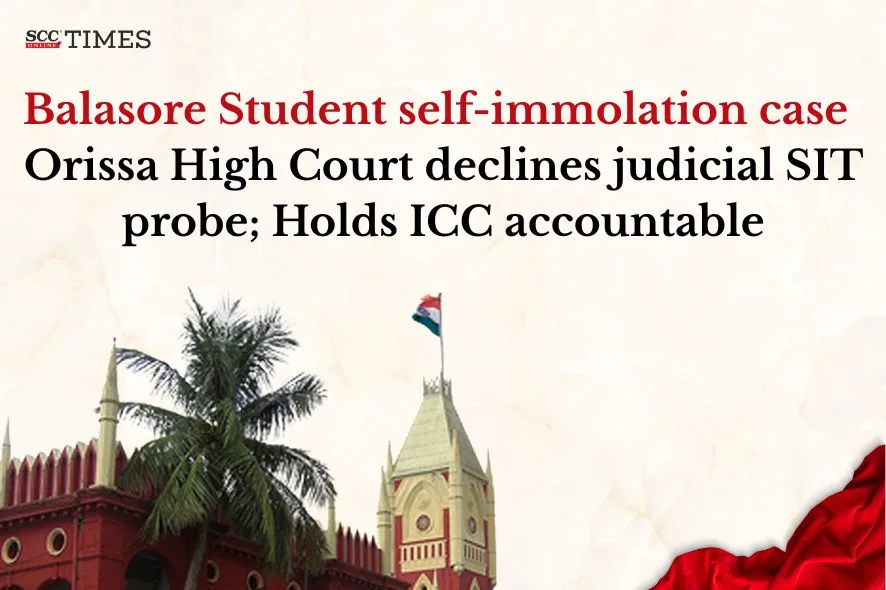Orissa High Court: The present Public Interest Litigation (‘PIL’) was filed by the petitioner, a public-spirited person raising concerns over an unprecedented incident dated 12-7-2025, in which the victim of sexual harassment committed self-immolation by pouring petrol in front of the Principal’s office. Despite medical attention, the girl succumbed to burn injuries on 14-7-2025. The petitioner sought the constitution of a Special Investigation Team (‘SIT’) headed by a responsible officer of repute ensuring fair investigation. The Division Bench of Harish Tandon, CJ., and Manash Ranjan Pathak, J., declined the prayer, noting that SIT had already been constituted by the State. The Court held that constituting a SIT over the SIT constituted by the Government may not be proper at the nebulous stage of the investigation unless the Court, upon examining the materials presented before it, perceived that the investigation had been misdirected.
Background:
The incident that initiated the PIL shocked the conscience of the country and opened a discourse on issues of safety, security and the functioning of redressal mechanisms. It was noted that the victim raised a serious issue of sexual harassment. Although the Internal Complaints Committee (‘ICC’) had submitted its report following an inquiry, the girl immolated herself under the perception that justice had not been extended to her.
The petitioner prayed for the constitution of a SIT to be headed by a responsible officer of repute, ensuring a proper and fair investigation. In response, the Advocate General submitted that the State had already constituted a SIT, which was being monitored by high-ranking police officials, one of whom was a lady officer. It was further contended that the steps had been taken with seriousness and urgency. The Head of the Department and the Principal of the college had been apprehended and put under suspension.
The petitioner also raised the issue of political demonstrations disrupting official functioning, alleging that certain officials were being prevented from discharging their duties.
Analysis and Decision:
The Court observed that it was really disturbing that students admitted to a reputed college would be subjected to sexual harassment and that the authorities failed to show the required alacrity in addressing the grievance in a proper manner. The Court emphasised that the right to life enshrined under Article 21 of the Constitution included the right to live with dignity and students, as citizens of the country, were not foreign to such fundamental rights. The Court remarked that once a serious allegation was made, it was a duty of the ICC to evaluate such complaint in a pragmatic manner.
The Court had noted that since the SIT had already been constituted by the State and the investigation had been monitored by high-ranking police officers, and in the absence of any incriminating materials coming before the Court, it was not appropriate that any SIT be constituted under the judicial fiat at that stage. The Court reasoned that while constituting a SIT over the one already formed by the Government might not be appropriate at the nebulous stage of the investigation, it nonetheless retained the duty to ensure that the investigation was being conducted properly and could therefore seek periodic progress.
The Court emphasised that in a democratic society, the right to protest is ingrained and inhered in the system, referring to the country’s legacy of freedom movement. However, the Court clarified that such protest must be peaceful, and no one should be allowed to take the law in their own hand nor should cause any disturbance to the normal life of a person. The Court further highlighted that our country had embraced the dissenting views, but any act in the guise of a dissent which offended any provision of law could never be regarded as a right guaranteed under the Constitution, as every fundamental right was subject to such reasonable restrictions which were imposed on every citizen of the country.
The Court reiterated that, since law and order was a State subject and it was the duty of the State to take appropriate measures or steps, the State was therefore directed to act as permitted by law in case any act impermissible or forbidden by law was committed by a person or an association of persons.
The Court, therefore, directed the State to submit the progress of the investigation and further issued notice to the opposite parties for no representation.
The Court listed the matter on 12-8-2025.
[Shivsankar Mohanty v. State of Orissa, 2025 SCC OnLine Ori 2877, decided on 22-7-2025]
Advocates who appeared in this case :
For the Petitioner: Shivsankar Mohanty
For the Opposite Parties: Pitambar Acharya, Advocate General assisted by Suman Pattanayak, Addl. Govt. Advocate, T.K. Satapathy, Standing Counsel



